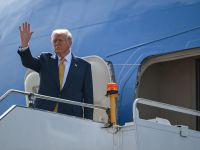The director of the UN Oil-for-Food program in Iraq, Benon Sevan, on Tuesday urged both the organization and the sanctions-hit state to adopt a fresh approach and be more flexible to improve the humanitarian deal.
"There is an urgent need to look into the implementation of the program with a fresh look, with a fresh approach and flexibility," Sevan told reporters.
"Without breaking rules and procedures, I think we can use the rules more credibly and avoid, on the one hand, putting in place procedures to expedite and, on the other hand, not allowing its full implementation.”
"As I said, there is room for improvement in the behavior and performance by all parties. There has to be a concerted effort to move forward," said Sevan, who is due to leave Iraq Wednesday after a 17-day tour, during which he has held talks with Iraqi officials calling for a review of the aid program.
Sevan stressed that his role was apolitical and centered only on improving the aid program, which he said was not a long-term solution to the problems Iraqi people were facing.
"We are trying to persuade all concerned that the issue should be humanitarian and maintain this distinct identity despite all differences among the members of the Security Council," he said.
"The program was never meant to solve all the problems and needs of the Iraqi people. It is becoming worse because, as the years go by, the needs are getting more acute."
Iraq, which has been under embargo since its 1990 invasion of Kuwait, is authorized to export crude oil under the program to finance imports of essential goods under strict UN supervision.
Baghdad has frequently complained of delays in the arrival of supplies, which have to be vetted by the UN sanctions committee, and accuses the United States and Britain of blocking its contracts with foreign suppliers.
But Sevan said on his arrival in Baghdad that the committee had now agreed "on a list of parts and equipment which would be approved by a group of (technical) experts" rather than the committee itself.
Also under new "procedural improvements," he said, lists have been drawn up of food, health, educational and agricultural products that would not need to be submitted to the sanctions committee for approval.
Sevan said Tuesday that in the week ending August 11th, Iraq exported 14.2 million barrels of oil with an estimated value of 348 million dollars, adding that oil revenues from the current phase VIII are estimated at 2.9 billion dollars.
He added that from mid-May to August 10th, the program released contracts worth 1.2 billion dollars - BAGHDAD (AFP)
© 2000 Al Bawaba (www.albawaba.com)







